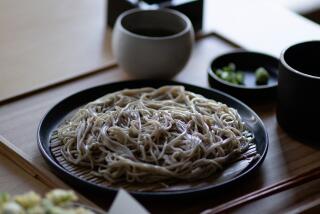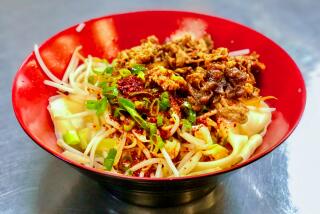A Slippery Tale
- Share via
Who invented noodles? According to a pretty unbelievable story in the 10th century Arabic cookbook Kita^b al-Tabi^kh, it was a 6th century Persian monarch.
Supposedly, King Khosrow I was on a hunting expedition when his party caught an onager, or wild ass, which his chef automatically made into soup. But when it was served, the king said, “I find my soul yearns for something in which there is bitterness and pungency.”
“God prosper the king,” said a courtier, “I have had soup with a condiment of whey, walnuts and garlic.”
“Go, make for us this condiment,” said Khosrow, “and also cook pieces of dough in the soup.” The story goes on to say that he liked the noodles (la^khsha^) he had so casually invented and took to demanding onager-noodle soup every day and that after his death commoners started having it too.
Well, people attribute a lot of things to Khosrow I, including the introduction of the game of chess from India. But whether he invented noodles or not, the Persian noodle in question is definitely quite ancient. The word la^khsha^ is still current in Afghanistan (lakhchak) and has traveled as far east as Malaysia, where laksa is a fish and noodle stew. In Eastern Europe it gave words for “noodle” to Hungarian (laska), Russian (lapsha) and Lithuanian (lakstiniai). The Ukrainian form of the word, lokshina, became the Yiddish word lokshn.
It’s no longer used in Iran, where the modern word for noodle is reshteh, which has the same literal meaning (“string”) that the word “spaghetti” has in Italian. The basic meaning of la^khsha^ is even more fitting: “the slippery thing.”


